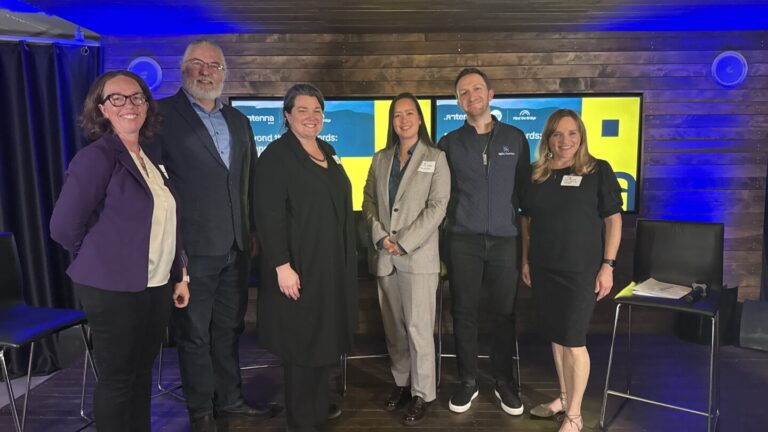
Breana Wheeler, U.S. Director of Operations at BREEAM; Tim Smith, real wstate development director at SKS; Anica Landreneau, global head of sustainability at HOK; Tansy Mak, associate VP of design at Related California; Aaron Tartakovsky, CEO at Epic Cleantec; and Michelle Malanca Frey, San Francisco-based mission-driven strategist.
In a world increasingly driven by environmental concerns and economic realities, the movement for sustainable commercial real estate has only gained momentum, despite shifting political tides.
This message was clearly conveyed during the recent SF Climate Week panel titled “Beyond the Buzzwords: Strengthening Real Estate’s Climate Narrative.” The panel featured prominent experts: Breana Wheeler, U.S. director of operations at BREEAM; Tim Smith, real estate development director at SKS; Anica Landreneau, global head of sustainability at HOK; Tansy Mak, associate VP of design at Related California; and Aaron Tartakovsky, CEO at Epic Cleantec. Michelle Melanca Frey, former executive director of ULI San Francisco, served as moderator.
The language of sustainability
As the panelists discussed, language surrounding sustainability may evolve, depending on the audience, but the core principles remain unchanged. Anica Landreneau offered insight into this phenomenon when she stated, “Instead of ‘sustainability,’ we might say ‘resources,’ but that practice is not necessarily new. When I’m working in the state of Florida, I might not say ‘climate change’ or might not say ‘decarbonization’ . . . but they do care about impacts.”
For Tansy Mak, as well, the language of sustainability changes regionally. Related has offices in West Palm Beach and in San Francisco. “You don’t talk to the leadership the same way in each of those offices, especially with [the] global sustainability lead. So, we’re really trying to internally create standards that allow the boots on the ground to take it in a very localized way and treat it the way that makes sense for their business case.”
Breana Wheeler echoed this sentiment, explaining how terminology is adapted to fit different contexts, particularly in the industrial sector: “In the industrial world, we talk about it differently. Resilience is about, you know, business continuity.” Ultimately, Wheeler affirmed that “this is a business imperative,” demonstrating that, although the vocabulary may shift, the foundational concepts of sustainability remain integral to the industry.
From nice-to-have to must-have
The discussion highlighted a crucial change: sustainability is no longer just a marketing tool or a nice add-on. “We are seeing a greater consideration for what gets…
Read More: As the Language of Sustainability in Real Estate Changes, Business



